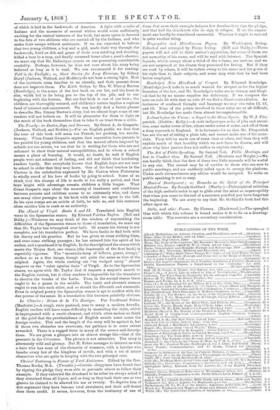The .Enid of Virgil. Books I. and IL Translated into
English Terse in the Spenserian stanza. By Edward Fairfax Taylor. (Bell and Daldy.)—Whatever we may think of the wisdom of superaddirg the difficulties of the Spenserian stanza to those of translation, we must say that Mr. Taylor has triumphed over both. Of course his victory is not complete, nor his translation perfect. We have faults to find both with bis theory and his practice. But he has given us some striking lines, and even some striking passages ; he has entered into the spirit of his author, and reproduced it in English. In the descriptionof the storm which meets the Trojan fleet, one stanza (the fourteenth of the first book) is especially vigorous. The "mountain-heap of billows, gaunt, abrupt," strikes us as a fine image, though not quite the same as that of the original. Again, the winds rushing out in wedged array " almost improve on the " velut agmine facto " of Virgil. As to the Spenserian stanza, we agree with Mr. Taylor that it imparts a majestic march to the English version, but it often renders it impossible for the translator to observe the breaks of the Latin. Thus, in the second stanza there ought to be a pause in the middle. The tenth and eleventh stanzas ought to run into each other, and so should the fifteenth and sixteenth. Even in original poetry the Spenser•ian stanza is apt to conflict with the due pauses of the sense. In a translation this becomes painfully obvious.








































 Previous page
Previous page